Charley
Pride
In the 1960s, Charley Pride became country music’s first Black superstar, lending his warm baritone to music that captivated audiences, broke racial and cultural barriers, and led him to a place in the Country Music Hall of Fame. His hit-making heyday lasted from 1966 through the 1980s, but his impact is still being felt. A 2020 recipient of the Country Music Association’s Willie Nelson Lifetime Achievement Award, Pride was an inspiration to generations of performers, a model of quiet dignity and artful fortitude.

-
Inducted2000
-
Born
March 18, 1934
-
Died
December 12, 2020
-
Birthplace
Sledge, Mississippi
In the 1960s, Charley Pride became country music’s first Black superstar, lending his warm baritone to music that captivated audiences, broke racial and cultural barriers, and led him to a place in the Country Music Hall of Fame. His hit-making heyday lasted from 1966 through the 1980s, but his impact is still being felt. A 2020 recipient of the Country Music Association’s Willie Nelson Lifetime Achievement Award, Pride is an inspiration to generations of performers, a model of quiet dignity and artful fortitude.
Mississippi Roots
Raised in the segregated South as the son of a sharecropper, Charley Frank Pride was born on a forty-acre cotton farm in Sledge, Mississippi, fifty miles south of Memphis. He spent his childhood laboring in fields, playing baseball, and listening to the Grand Ole Opry on a Philco radio. Pride’s father was a big fan of the Grand Ole Opry, and Pride was musically schooled on the likes of Roy Acuff, Pee Wee King, Ernest Tubb, and Hank Williams. Pride bought his first guitar when he was fourteen and began developing a style of singing that would come to impress his heroes.
“What came from my throat was my voice, no one else’s,” he wrote in his autobiography. “No one had ever told me that whites were supposed to sing one kind of music and blacks another — I sang what I liked in the only voice I had.”
At sixteen, Pride left Mississippi to play baseball in the Negro American League. He was enamored of Jackie Robinson, who broke Major League Baseball’s color barrier in 1947.
“To say that he was my idol would be an understatement,” Pride said. “As far as I was concerned, Jackie Robinson had rewritten the future.”
Songs
00:00 / 00:00
00:00 / 00:00
00:00 / 00:00
RCA’s New Star
Pride never realized his Major League Baseball dreams, but he rewrote country music’s future. His gifts as a singer were greater than his athletic prowess. In 1962, country stars Red Sovine and Red Foley heard Pride singing in Helena, Montana, and encouraged him to come to Nashville. A year later, Pride auditioned in Nashville for manager Jack Johnson, and Johnson was astounded.
Johnson introduced Pride to renegade producer Cowboy Jack Clement. On August 16, 1965, Clement took Pride to RCA’s Nashville studio and recorded demonstration recordings that impressed RCA Records Nashville chief Chet Atkins, who flew to Los Angeles and received approval from the label brass to sign Pride to the label (only revealing Pride’s race after the deal was agreed upon).
Pride’s first single, “Snakes Crawl at Night,” was released in January 1966. RCA kept Pride’s race secret from country radio disc jockeys until the third single, “Just Between You and Me,” climbed into the country Top Ten. Seeing the cover of his gold-selling first album, Country Charley Pride, was the first time many fans discovered that he was Black.
“I get a lot of questions asked me . . . ‘Charley, how’d you get into country music and why you don’t sound like you’re supposed to sound?’” Pride said during a 1968 concert at Panther Hall in Fort Worth, Texas. “It’s a little unique, I admit. But I’ve been singing country music since I was about five years old. This is why I sound like I sound.”
Videos
“Mississippi Cotton Pickin’ Delta Town”
The Mike Douglas Show, 1975
“I Can’t Believe That You Stopped Loving Me”
Country Music Association Awards, 1970
Image Gallery
-
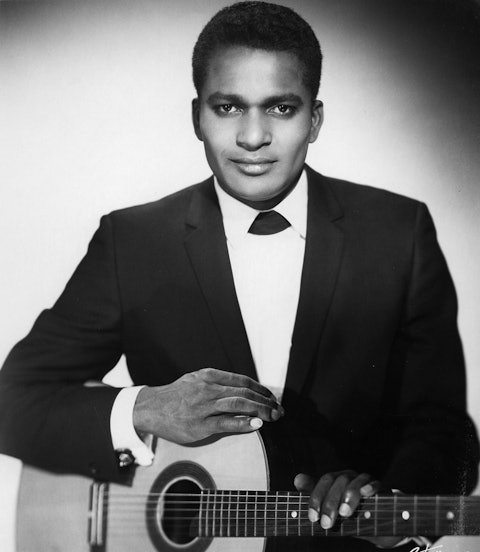
RCA publicity photo, c. 1967.
-
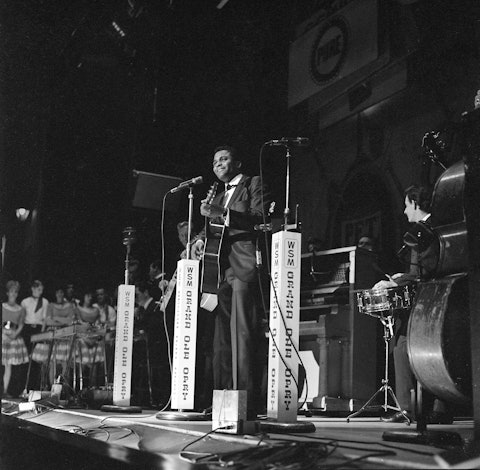
Charley Pride makes his Grand Ole Opry debut, 1967. Photo by Walden S. Fabry Studios.
-
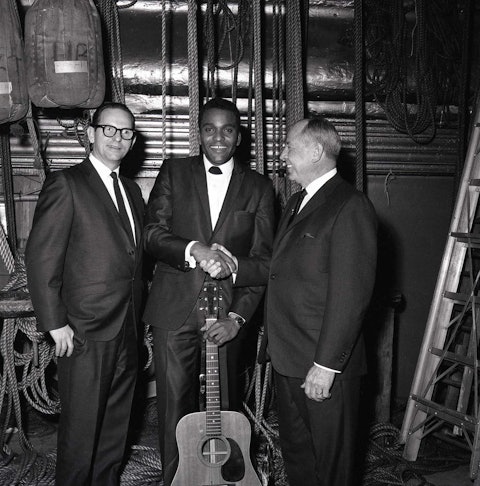
Backstage at the Grand Ole Opry, 1967 (from left): Pride’s manager Jack D. Johnson, Charley Pride, and Opry manager Ott Devine. Photo by Walden S. Fabry Studios.
-
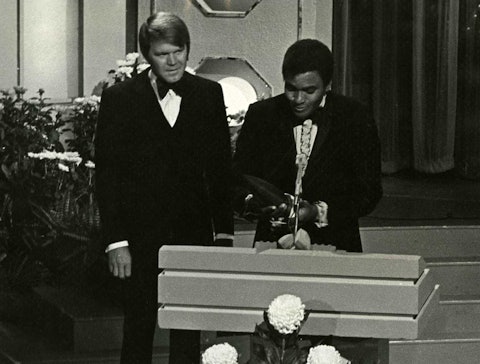
Charley Pride accepts the Country Music Association Entertainer of the Year award from Glen Campbell, 1971.
-
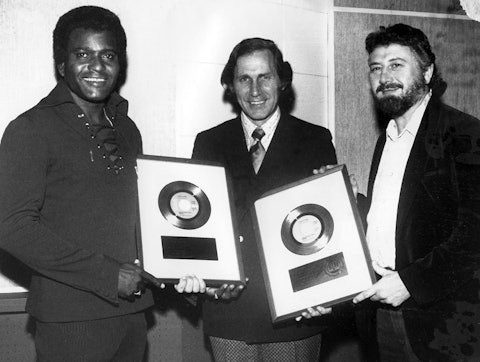
Charley Pride celebrates gold record sales awards with RCA label head Chet Atkins and producer Cowboy Jack Clement, 1973.
-
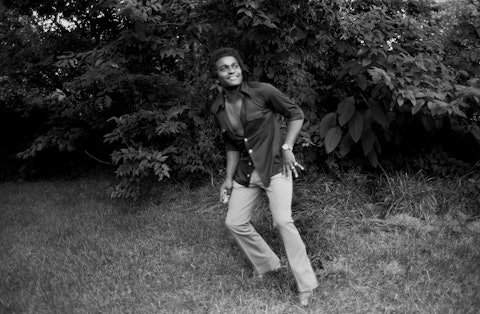
Charley Pride, 1975. Photo by Raeanne Rubenstein.
-
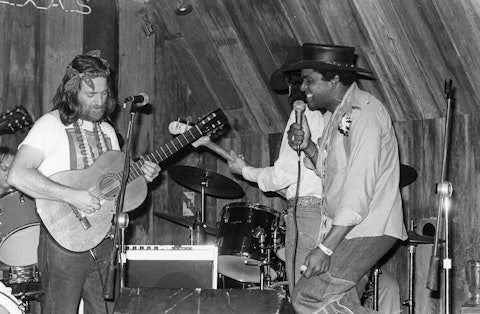
Willie Nelson and Charley Pride perform for a Country Music Association event in Texas, 1979. Photo by Melinda Wickman.
-
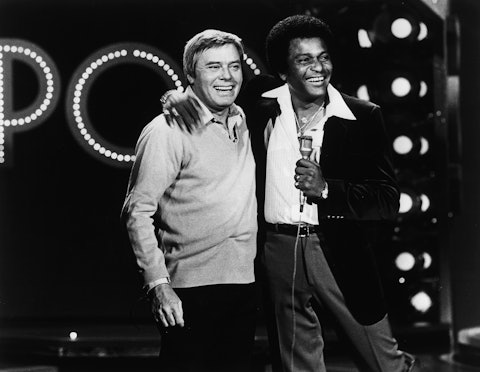
Charley Pride appearing on the television series Pop! Goes the Country, with host Tom T. Hall, c. 1980.
-
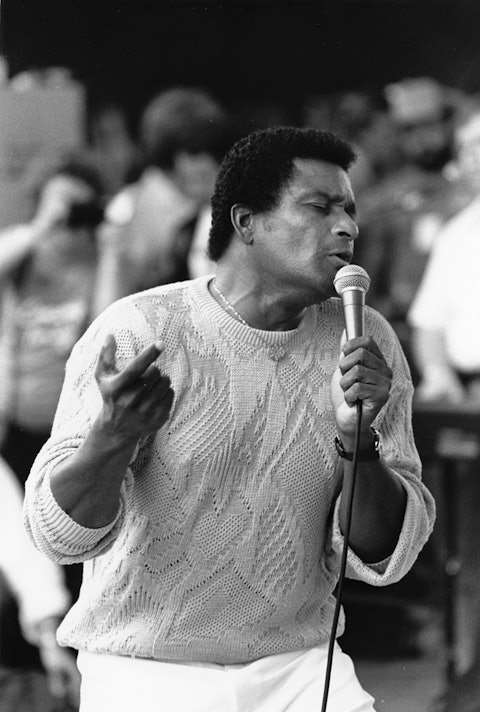
Charley Pride at Fan Fair, 1989.
-
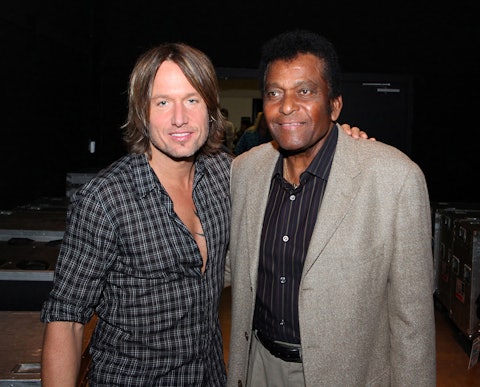
Keith Urban and Charley Pride at the 2010 All for the Hall benefit concert. Photo by Donn Jones.
Enduring Legacy
Pride responded to discrimination with square-jawed silence, determined that talent would overcome prejudice. His work spoke volumes. He was the CMA’s Entertainer of the Year in 1971, and he scored twenty-nine #1 country hits, including enduring classics “Is Anybody Goin’ to San Antone,” “Kiss an Angel Good Mornin’,” “All I Have to Offer You (Is Me),” “Someone Loves You Honey,” and “Mountain of Love.” He was named the CMA’s top male vocalist in 1971 and 1972, and was one of RCA’s top-selling artists for decades.
Beginning in 1969, Pride made his home in North Dallas, Texas, becoming an important real estate and banking investor in that community and a part-owner of the Texas Rangers baseball team. He owned a booking agency and management company, Chardon, which helped introduce Janie Fricke, Dave & Sugar, and Neal McCoy to stardom. Pride was also a partner in the Pi-Gem music publishing company with producer Tom Collins, while he continued to record hit after hit and tour regularly to packed venues.
Pride was inducted into the Grand Ole Opry in 1993, seven years before his induction into the Country Music Hall of Fame.
At the Hall of Fame and Museum’s donation ceremony for Cowboy Jack Clement’s guitar in 2018, Pride recalled what Clement said about his early recordings. “‘Charley, these songs we’re recording right now, fifty years from now they’re gonna be spinnin’ ‘em.”
It has been more than fifty years, and those songs are still spinning.
—Peter Cooper and Bob Millard
Adapted from the Country Music Hall of Fame® and Museum’s Encyclopedia of Country Music, published by Oxford University Press
“It’s a little unique, I admit. But I’ve been singing country music since I was about five years old. This is why I sound like I sound.” —Charley Pride



